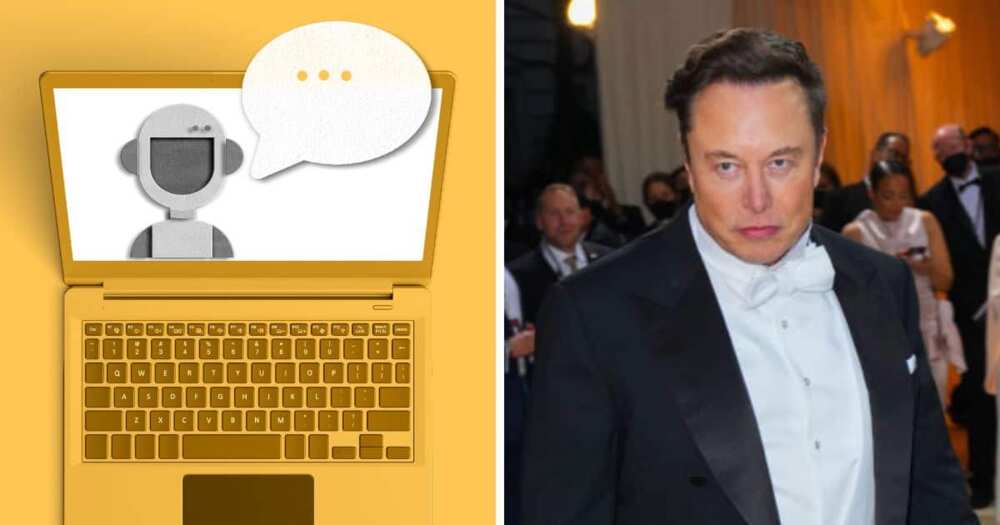Explained: What Are Bots, and Why Are They Delaying the Elon Musk Deal's to Buy Twitter for $44 Billion?
- "Bot" is short for "robot", and they have come to more people's attention thanks to Elon Musk and his pending deal to buy Twitter
- Bots are computer programmes that mimic humans and can calculate at a much faster pace, particularly useful when the command is repetitive
- The bots Musk is concerned about are potential spam or fake accounts that don’t have real users; Twitter estimates 5% (or 229 million) of its daily active users are bots
PAY ATTENTION: Click “See First” under the “Following” tab to see Legit.ng News on your Facebook News Feed!
Elon Musk's deal $44 billion deal to buy Twitter has thrust the term "bots" into the public sphere recently. The billionaire didn't agree with the company's estimate that only 5% of its daily active users are bots.
There are good and bad bots, and we’re here to explain how they are created and why they’re here to stay, whether Elon Musk likes it or not.

Read also
Elon Musk threatens to walk away again from Twitter deal over alleged “breach” of agreement as wealth drops

Source: UGC
Elon Musk's much-publicised purchase of Twitter has been put on ice after the billionaire requested proof that only 5% of its accounts are fake, India.com reports.
According to Vanity Fair, Twitter was so upfront about the rather low number of bot or spam accounts on its microblogging site that's mentioned in its quarterly financial reports. Musk took umbridge over what he thinks is an abnormally low figure. The South African-born tech mogul tweeted that he thinks 20% of all Twitter accounts are bots.
PAY ATTENTION: Follow us on Instagram - get the most important news directly in your favourite app!
To make sense of this, we've explained what a bot is, how they work and why Musk is so worried about them on Twitter.
What is a bot?
Simply, a "bot" is an internet robot and is far removed from the R2-D2 Star Wars character you're thinking of. A bot is an internet application that uses code or script to provide a function that can perform automated tasks, usually at high speed, reports Deutsche Welle Shift.

Read also
Viral video of woman taking a walk with her robotic dog in a busy area goes viral, sends people into a frenzy
How are bots created?
According to TechTarget.com, bots are created via a set of algorithms that are coded and designated with tasks to complete. There are several types of bots that can carry out different things, such as chatting to a human who needs information (commonly known as "chatbots") or scouring websites for relevant information.
Believe it not, we’re constantly interacting with as we spend time on the internet, e-hailing apps and even messaging applications.
What are bots used for?
The most common use for bots is web crawling, which uses a type of coding called scripting. This allows the coder to design a programme to do something, and in the case of web crawling, it scours the internet and looks for keywords, analyses that information and then stores it. In fact, bots are thought to be responsible for an inordinate amount of web traffic.
Without even knowing it, most internet users have interacted with a chatbot. This programme uses automated responses to help us navigate banking, online shopping or logging a request.

Read also
Oyinbo man abroad who lives inside his car turns it into office and works from there, video goes viral
Social bots can be created to hone in on keywords and send positive messages to accounts of people who enjoy the same subject, for example, football, of which there are millions, a task that would take literally years for a human to do.
However, social bots can also be programmed and used negatively to send messages, retweet or like tweets about gun violence or climate change. These are the ones Musk is concerned about.
Why is Elon Musk worried about bots?
Musk quite rightly has drawn attention to Twitter bots, which are created by people who create things for other companies using the microblogging's public API (application programming interface), reports India.com.
According to Twitter's company policy, it allows positive bots such as automated accounts, including bots that help you find vaccine appointments and disaster early warning systems.
However, spam bots that are used to drive traffic to a particular site, retweet negative political messages and encourage financial scams are not allowed.
Twitter says:
"You can’t mass-register Twitter accounts or use automation to create Twitter accounts, you can’t artificially amplify or disrupt conversations through the use of multiple accounts or by coordinating with others to violate the Twitter Rules."
Until Twitter provides Musk with proof that less than 5% of Twitter accounts are bots, the deal is on hold. In fact, the Tesla founder has described Twitter as the "21st-century town hall" and is adamant that space cannot be contaminated by bad bots, reports The Verge.
Tesla and SpaceX owner Elon Musk, the world’s richest man, has $10 billion wiped off his net worth
South African-born entrepreneur and the founder of SpaceX and Tesla, Elon Musk, lost $10 billion of nett worth, Legit.ng reported. The chief executive of Tesla has a nett worth of $201 billion despite losing a substantial value.
As of Tuesday 23 May, the 50-year-old's nett worth dropped from $212 billion on Thursday 19 May to $201 billion the following day, 20 May. The Tesla boss has been in the news recently amid a pending deal to purchase social networking site Twitter.
The company's board green-lighted a $44 billion from Musk, but the deal has hit a dead-end after Musk sought clarity on how many spam and fake accounts are on the site.
Source: Legit.ng


